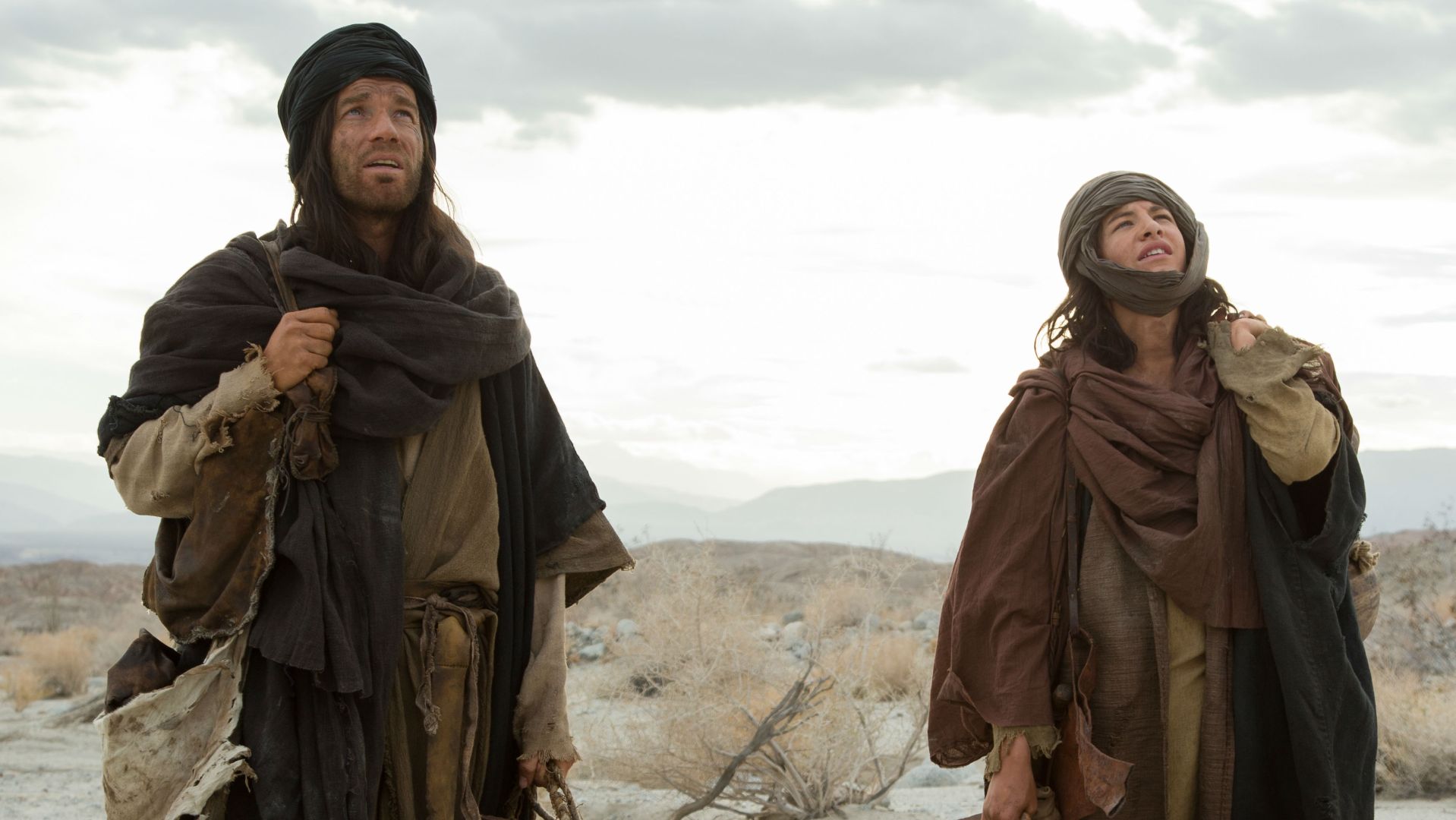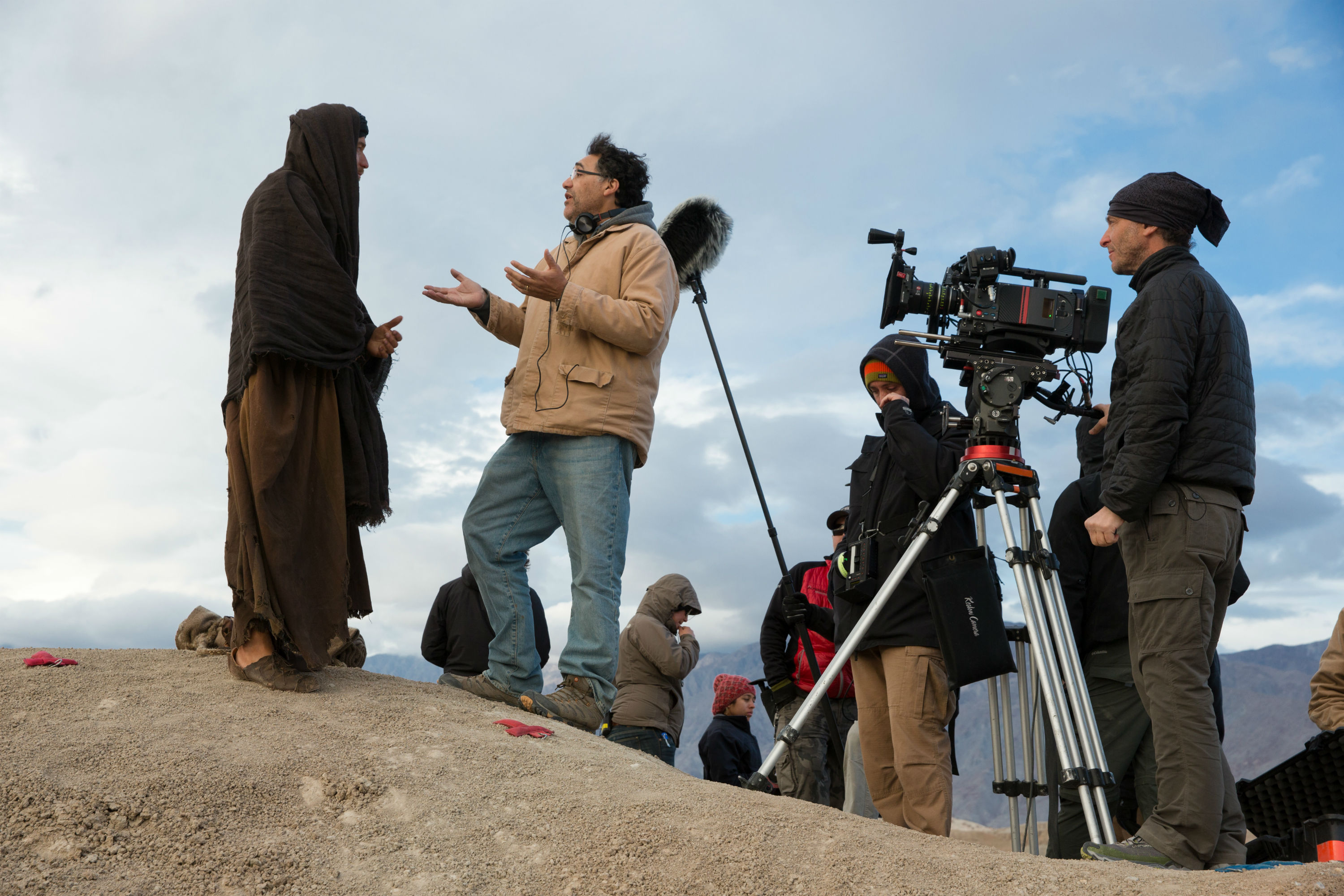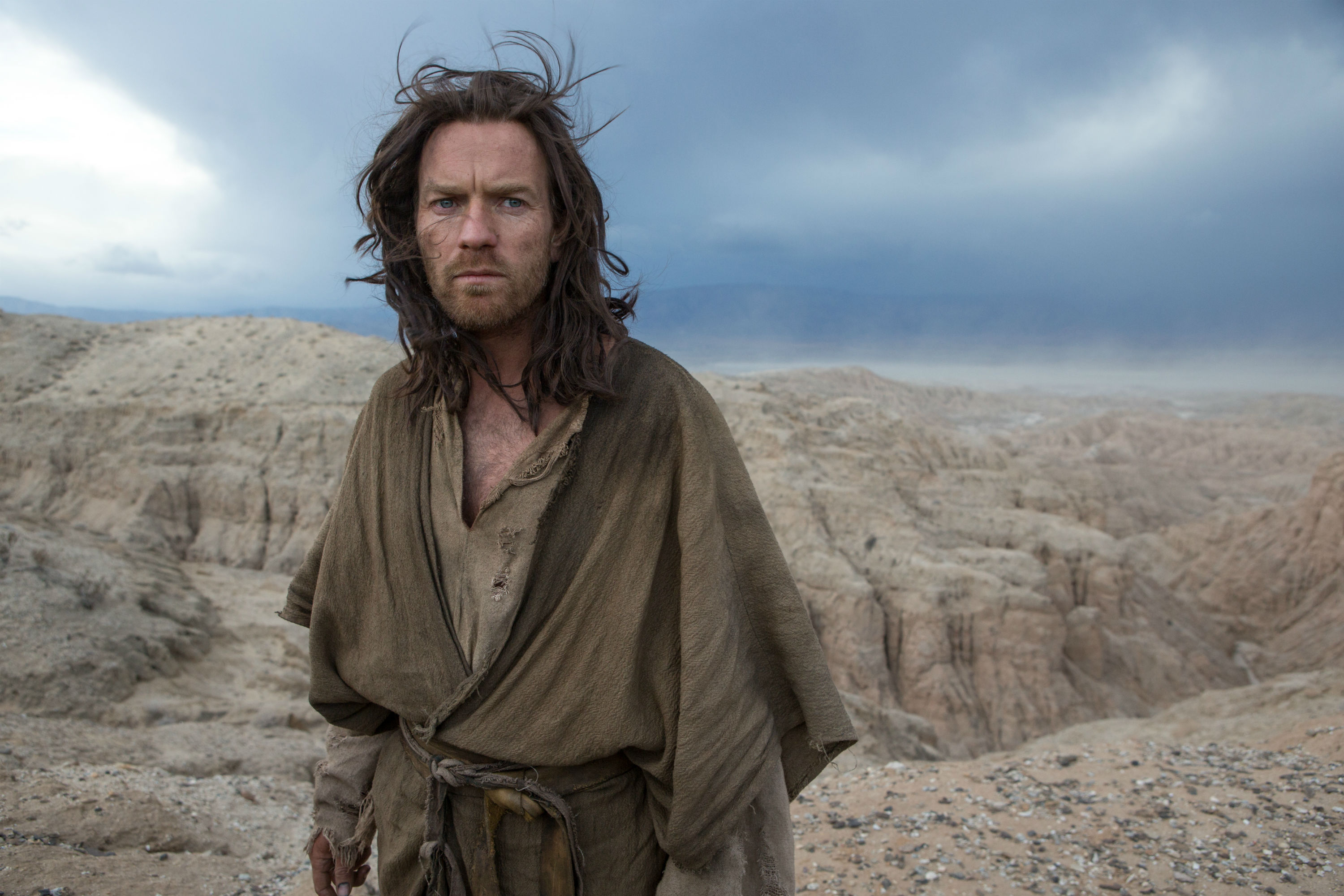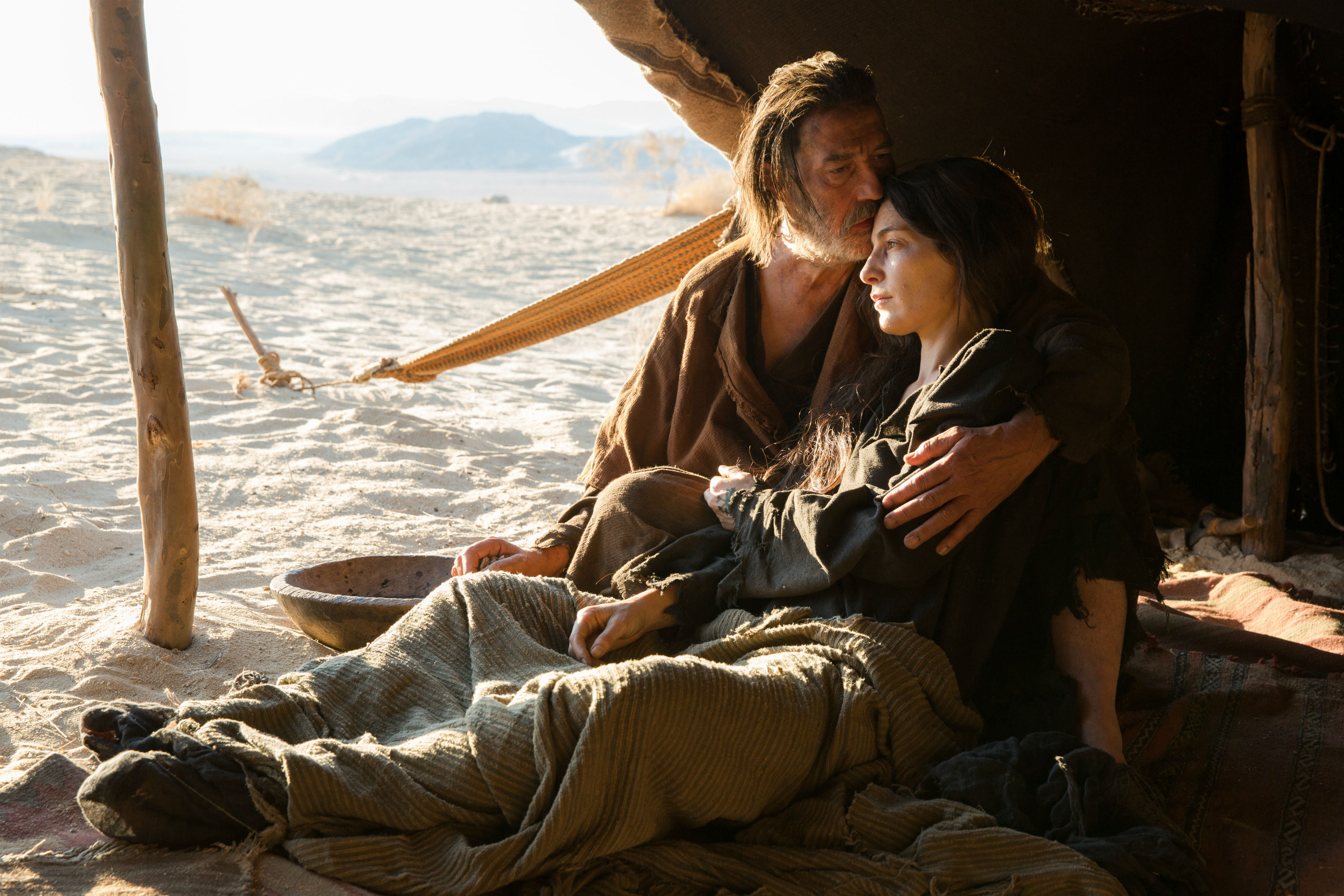"I cringe a little bit when I think 'Bible movie,'" says Rodrigo Garcia, with a smile.
The writer/director is talking about Last Days in the Desert, his new film premiering at Sundance next week, which stars Ewan McGregor as Jesus and Satan. Garcia isn't against Biblical epics, but that isn't what he's made—no eye-popping effects, no epic battles, no lines lifted from Bible passages. Instead, Last Days is a character-driven meditation on family and mortality, haunting and spare.
On a cold December weekend in New York City, I'm meeting Garcia over breakfast and coffee to talk about how you make a movie about fathers and sons in which the main character also happens to be the most famous son of all time: Yeshua, as the film calls him.
 Francois Duhamel
Francois Duhamel“I wrote a few pages in which I called him Jesus,” Garcia explains. “But when you're writing a screenplay and it says ‘Jesus walks, Jesus says,’ after a while, the weight of the name is paralyzing.”
As Garcia reminds me, in his native Spanish, Jesus is a common name. “But in English, it has big connotations”—nobody in the English-speaking world names their kid Jesus. "Once I decided I'm going to call him Yeshua, it liberated me."
Garcia is not a devout Christian, but he grew up in Catholic Colombia, “so I am as well-versed as the average Catholic person is on the circumstances of Jesus. Even as a child, I never felt a strong religious impulse, but I was always fascinated by him.”
The son of Gabriel Garcia Marquez, the Nobel Prize-winning author of One Hundred Years of Solitude and Love in the Time of Cholera, Garcia grew up around writers and artists. His previous films include Albert Nobbs (which garnered Oscar and Golden Globe nominations for actresses Glenn Close and Janet McTeer), Mother and Child, Nine Lives, and Things You Can Tell By Just Looking At Her. He produced and developed the HBO series In Treatment and has directed episodes of several other HBO series, including Six Feet Under and Big Love.
Unlike the epics and myths on which most “Bible movies” are based, Last Days feels like a short story, a form which Garcia loves for its ambiguity and constraints. “Rather than tell you a whole world, they sort of immerse you in it very quickly and introduce whatever conflicts are there—some said and some unsaid. And then you come out of it more with a feeling of having been somewhere, than with that clarity that everything was wrapped up.”
But he certainly never set out to write a movie about Jesus: “I am as surprised as anyone else. I don't know what organ in my body it came from. It just came out of me.”
Forty Days in the Desert
Three of the four gospels tell this story: after his baptism by John, Jesus goes into the Judean Desert to fast and pray for forty days. As recounted in the gospels of Matthew and Luke, Satan tempts Jesus during this time in three conversations, and Jesus resists. By the time he leaves, he is ready to start his public ministry.
Last Days imagines a story set during the final few days in the wilderness. After over a month of solitary wandering, Yeshua is tired, dirty, exhausted, hungry, and lonely, weary of not hearing his Father’s voice. He happens upon a family in the wilderness who recognize that he is a holy man and offer him shelter and hospitality; in return, he offers them some help with carpentry.
The father, played by Irish actor Ciaran Hinds (Road to Perdition; Tinker, Tailor, Soldier, Spy), has a relationship with his son familiar to anyone who has ever been a teenager: equal parts love and confusion, trying to both connect with him and protect him, but not sure how to do either. The son (Tye Sheridan, the brilliant young American actor seen in Mud, The Tree of Life, and Joe) obeys his father and cares for his sick mother (celebrated Israeli actress Ayelet Zurer), but dreams of living in Jerusalem.
Yeshua forms relationships with both the boy and his father over the course of their conversations, but he has another conversation partner: Satan himself, a suaver version of Yeshua with a glint in his eye. Satan taunts and tempts Yeshua away from the work that lies ahead, suggesting that the Father doesn’t really love him.
Writing an extracanonical screenplay about the most famous man in history presents some interesting challenges. For one, your protagonist's life has been recounted in various artistic forms for millennia and is enacted each week in millions of churches around the globe. Those restrictions were not lost on Garcia. “By choosing Jesus, I know what the end is," he says. "I have some freedoms because it’s an invented chapter, but I have to obey the origin and obey the destiny.”
Then you have to figure out who will embody Jesus well, and Garcia saw a good fit in Ewan McGregor, who's played everyone from a drug addict in Trainspotting to a fisheries expert in Salmon Fishing in the Yemen to the glam-rocker of Velvet Goldmine and the lovestruck poet of Moulin Rouge—and, of course, Obi-Wan Kenobi himself. “Ewan brings such human empathy to it,” Garcia says. “He's so likeable. It’s one of the reasons I wanted to do it with him: apart from him being an excellent actor and very thoughtful and smart, the audience connects with him like he's a regular bloke. And you feel his love for these people.”
Garcia met McGregor through the film’s mega-award-winning cinematographer, Emmanuel Lubezki (The Tree of Life, Gravity, Birdman), when their families spent the holidays together. Garcia and Lubezki (who often goes by the nickname “Chivo”) are old friends, and McGregor was acquainted with Lubezki as well.
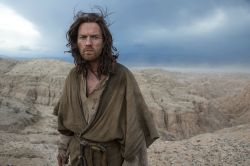 Gilles Mingasson
Gilles MingassonAt the time, McGregor was prepping for the Australian indie film Son of a Gun (in theaters this weekend). “I had to get muscle-y for it,” he tells me later in the day over tea and dinner, grinning. That Christmas, he says, “I was in the middle of a gym program to prepare for it. I brought a pair of TRX straps that I hung outside my room, because there was a balcony and a door that I could hook them over. In the afternoon, I would go for a run, and then I would work out for an hour on these stupid straps.”
“Occasionally, people would walk past,” he says, “and that included Chivo. It was clear that he was checking out how dedicated I was to the work, because I was on Christmas holiday, but I was still breaking my back in order to use these straps every day.” Two weeks later, McGregor got a call from the film’s producers.
McGregor met with Garcia. “What is it about?” he asked. “Rodrigo says, ‘Oh, I don’t think you’d be interested,” which McGregor says is “like a red flag to an actor: ‘Oh? Won’t I?’”
The Last Days script is short—around 60 pages, compared to the usual 120 for a feature film. For the first few pages, McGregor says, "there are no details of where it is, or when it is, or anything. It’s just this beautiful poetic description of a man in a desert: sleeping under a tree, being cold, waking up, being hot.”
McGregor’s interest was piqued. He's known for taking challenging roles. When I meet him, he's just come from a matinee performance of The Real Thing, the Tom Stoppard revival in which he co-starred with Maggie Gyllenhaal that was also his Broadway debut (it closed January 4). Actors know that there's theater, and then there's Stoppard—and that sort of challenge is what McGregor thrives on.
So when he got the Last Days screenplay, he kept reading: "I was going, maybe it’s a fantasy movie or something, I don’t know." He got to a part in the script where the man sees a figure walking toward him, and a light went on. “As the figure gets closer, he realizes that it is him! And [the screenplay] says, ‘It is Lucifer,’ and I went, ‘Oh ho . . . Now I realize who the man is.’”
No Desert Postcards
McGregor finished the script, and was captivated—“I’ve never felt like a film was as important as this one for a long, long time. I was so moved by it, and so immediately passionate and connected to it.” He signed onto the project, which shot in five weeks in the California desert.
“It was an amazing experience, because it was so small a crew. The first week was mainly me wandering around, along with my double, Nash. We had about three or four cars,” McGregor explains. “They picked all of these amazing locations. In this one small desert area, they found all these different places that made it look like I was traveling a long distance.”
As a low-budget indie, Last Days worked well largely because of the filmmakers' flexibility and trust in one another's intuition. “We’d often be on our way to one [location],” McGregor says, “when Chivo’s car, which was always in front, would stop, the doors would fly open and we’d all run out. Chivo would tell me to walk here, do this, run over there. ‘What?’ ‘Just do it!’”
“It felt like everything filmmaking should be,” he says. “The freedom and the fun it can be, because it often isn’t. There’s too many people and too many technicians, too much money involved, and it’s the opposite of creative freedom. This was just as perfect an experience as it could be.”
Garcia agrees that Lubezki was an integral part of the film’s aesthetic: “He says to me early on, ‘Look, we’re never going to have time or money to be lugging huge equipment out there. So why don’t we do it without lights?’”
“Then we had a whole creative take on what it should look like,” he continues. “The desert has a natural beauty, but we didn’t want it to be harsh. We didn’t want it to be this movie full of desert postcards . . . [We wanted] that sense of isolation.”
That sense is underlined by the film's gorgeously minimalist classical score, composed by Saunder Jurriaans and Danny Bensi (Martha Marcy May Marlene, The One I Love, Enemy). "Conceptually, it was hard. There’s not really much music in the movie," Garcia says. "We wanted a lot of silence, a lot of desert . . . I wanted the score to be its own thing."
The Father of Lies
Some of the film’s most unforgettable scenes are conversations between Yeshua and Satan, both played by McGregor. Satan, in Garcia’s telling, looks just like Yeshua, but is his opposite—“it really is just an attitude,” he says. “The demon has some jewelry, just to underscore some vanity. Like he was like, ‘I’m going to dress as you, but with style.’”
As recorded in John 8:44, Jesus calls Satan “a liar and the father of lies,” and that is how the film imagines him. Religious audiences may find themseves thinking, that’s not an orthodox take on the story, only to remember that this character was lying to Yeshua with every word.
And yet, in the Scriptural account, Satan was once Lucifer, the most beautiful of all the angels that God created, who was cast out from heaven because of his pride. Garcia’s take on the fallout of this (I don’t want to spoil it) is marvelously heartbreaking. He conceived of the character as “the black sheep, the punished child. It makes you feel [like] these two are (at least metaphorical) children of a father whose opinion counts a lot to them. That’s any child, really.”
McGregor agrees in his portrayal of the relationship between Jesus and Satan. “There was a jealousy there, because Jesus knows his father in a way that Satan can never know his father,” he says. “I played both characters as real people, no question.”
To shoot the scenes with Yeshua and Satan, McGregor relied on Nash Edgerton, his long-time stunt double, with whom he also worked on Moulin Rouge and the Star Wars trilogy, as well as Son of a Gun. (Edgerton also happens to be the brother of actor Joel Edgerton, who plays Ramses in Exodus: Gods and Kings.) McGregor asked Garcia to bring Edgerton onto the film for those scenes.
“I can’t imagine playing alongside anyone nicer for those scenes where I was opposite myself,” he says. “Nash learned all the lines, and it was a thankless task. We worked on it for five nights to memorize it. We’d start off with me playing Jesus and he’d be the devil, and then we’d swap . . . I got so used to seeing him that there’s a couple moments where I thought, ‘Oh no, they left Nash in!’ Then I looked closer and realized it was me.”
Giving God Skin
According to Christian theology, Jesus had two natures: human and divine. Movies that feature Jesus as the main character tend to emphasize one or the other. Many of them—presumably out of deep respect for Jesus—err on the side of divinity, resulting in otherworldly portrayals of Christ. Watching these sorts of films, it's hard to imagine Jesus being frustrated or lonely or afraid or unable to sleep because of a gnawing hunger. This Jesus probably wouldn't laugh at a joke or tell a riddle just for the fun of it.
On the other end of the spectrum, some films—the controversial ones, like The Last Temptation of Christ—scandalize the faithful by going off-book in ways that downplay or outright dismiss Jesus' divinity.
Last Days walks the line between these two, going off-book but staying true to the character. This Yeshua is confident in his identity as the son of God while also struggling and being tempted by everything that a man would find tempting: hunger, exhaustion, loneliness, anger, lust, fear. In McGregor’s portrayal, Yeshua is quietly kind, empathetic and loving, a friend and a holy man who can also enjoy a good joke. This is a Yeshua who could understand us as friends, no matter how we feel about him as son of God.
“I think we don't really have a sense—we do, but we whitewash it with faith and with stories—that Jesus and his followers were incredibly poor, modest people,” Garcia notes. When I remarked that Jesus was essentially homeless, he agreed—“and we dressed him as a homeless man.” Then again, “because of Ewan's presence, and because it is Jesus, you can throw as much dirt and raggedness on that as you want, but there's still a glow.”
 Francois Duhamel
Francois DuhamelGarcia is generous and friendly, so it's no surprise that he is humble about the limits of his own imagination. “I cannot address the divine side because I don’t know what that is like,” he tells me. “So I can only address the human side. And it helped me to have Jesus have someone to talk to at a human level—I know it sounds contradictory, because [Satan] is not a human—but their conversation takes place at a human scale.”
This deep empathy and respect for the characters permeates the film and spills over into the Yeshua character himself, who works hard to connect with his hosts as friends. “You know, I think when you write—at least for me—every character is me. I don’t know how to approach them in any other way,” Garcia says. “Whether they’re young or old, male or female, Jesus, demon, whatever they are, I can only see them in terms of what I know—or what I think I know—about what it feels like to be alive.”
“I am not so well versed in the Bible that I can say if when Jesus goes out to the desert, he knows what the ultimate sacrifice will be already. I don’t know if he knows. But he must have a sense that whatever it is, it’s going to be big. So I’m just trying to put myself in his position.”
"I Imagined God Was My Dad"
McGregor found the character of Yeshua just as weighty as Garcia did. Like Garcia, McGregor is not religious. But though he wasn’t raised in a religious family, he was brought up in Scotland, a culture shaped by Christianity. When I ask him how that shaped getting into the character, he says, “I must have been pulling from everything I learned while I was a kid—Sunday School, et cetera.”
“All my thoughts while playing Jesus, especially when I mentioned it to someone else, were ‘It can’t be done.’ So I kidded myself,” he says. “I told others, ‘Yes, I play Jesus.’ However, I told myself, ‘I’m playing a man whose father is God, and he’s trying to communicate with him.’ That was more helpful than telling myself, ‘I’m playing Jesus.’”
The story’s father and son theme helped him tap into Yeshua’s emotional center. “It’s not uncommon in many father/son relationships that there’s a point where there’s some difficulty in communicating with one another, whether it’s feeling loved or respected,” McGregor says. “It’s a normal rite of passage. I just tried to think about that, except that I imagined God was my dad.”
“I think this was the period of his life where he went to become certain. At the beginning, Jesus was tired and unhappy that God the Father wasn’t giving him answers, and he has things he wants to talk about. As he goes through the experience and interacts with the family, he becomes certain of his path.”
Garcia conceived of Yeshua’s struggle in the wilderness—echoed in the boy’s struggle to sort out his own future—as one with which any viewer could empathize. “It must be hard for any person [to know] that your story has already been told, meaning it’s already been told for you,” Garcia says. “There’s a creator, there’s a writer, there’s your beginning, your middle, and your end. That is something that if you are a devout Christian, you may happily accept, or you may have a conflict with it, but you know that that is it. I am not a devout Christian, so that idea that Jesus had to face that, the fact that his life had already been written for him—his human side must have struggled with that.”
Not a “Bible Movie”
In the last year, it's been hard to read about movies without hearing about the "year of the Bible movie," but neither Garcia nor McGregor think Last Days fits the genre. When people pointed out the similarities to McGregor during filming, he told them, “Well, I think we’re more of an art film. We’re not trying to make a Biblical story.”
That said, one of the unavoidable risks in making a movie featuring Jesus is how audiences will receive it—and religious audiences have been notoriously critical of films that don’t stick purely to the text. I asked Garcia what he thought about that. He pointed out that while you can’t make a movie wanting to please anyone, “I always thought that there was nothing very graphically provocative about this story.”
Religious audiences often react to particularly offensive images, he noted, like the ones that appear in movies like The Last Temptation of Christ. “I thought the way I was telling the story, the most that could happen was some people would say, oh, he’s got an odd point of view, but not that anyone would say this movie cannot be seen.”
And non-Christians have made movies about Jesus in the past. “I think everyone wants to approach him,” Garcia says. “For example, there’s a Pasolini version [The Gospel According to St. Matthew, 1964], which in many ways is very beautiful, and in some ways it’s stylized, and in the same ways it’s radical in the sense that they’re almost like Italian peasants. And yet it’s made by a Communist gay man. So . . . why not me?”
"With Christians and non-Christians alike, first of all, the story has to be compelling," he continues. "Wherever you come from, the basic bones of Jesus' circumstance, everyone understands. So I hope that the story of him encountering this family with their own father/son problem is a compelling enough story for anyone . . . I'm happy if whoever sees it has questions. The movie is full of questions. The movie's all about my own questions."
When I ask which questions he means, he laughs and rattles off a litany. “Where do you start? Are you really independent from your loved ones? Is destiny written? Is character destiny? If Jesus is the son of God, what an enormous circumstance, what an enormous package for him. If he is not the son of God, what a remarkable life, with what an incredible spiritual message . . . And then time: time goes by. What does it all mean in time? And if you are a believer, what does death mean? And if you are not a believer, what does death mean? Even Yeshua is not unconcerned with death in the movie."
Garcia knows these are hardly new questions, but they captivate him."I think that has been written about many times in other stories, Christian or not—if half of Jesus was human, there must have been a fear of death, an insecurity. A doubt.”
“For me,” he concluded, “the movie’s me pouring all my questions into the story in a dramatized form.”
When I ask if the biggest of these, given the film’s theme, deals with Garcia’s own relationship with the towering literary figure of his famous father, he chuckles. “I’m sure Dr. Freud and his legions are having a good laugh," he says. "You can’t write by thinking about what you’re doing. But yes, it’s a story about sons finding their destiny away from powerful fathers, though it’s not written for that purpose . . . It doesn’t feel that personal to me, although friends who have seen it feel that it’s insanely personal.”
“I suppose in the movie, God is writing the world, right?” he muses.
Whether the movie is or isn’t about Jesus, its main character is unavoidably one of the most important figures in history. “It’s ridiculous that it’s taken me this long,” he says, “and I think sitting here talking to you is the logical conclusion of it: I don’t know what I was thinking—if you make a movie with Jesus in it, your movie’s about Jesus.”
Jesus towers over any film he’s in, whether he’s wandering alone in the wilderness, dirty and tired and probably smelling bad, or arguing with the devil, or hanging out with a family around their evening campfire.
“It’s not a figure where you can weasel yourself out of it,” Garcia notes. “For better, for worse, for love, for hatred, for whatever, you cannot have Jesus in a movie and not consider his circumstances as the primary problem in the movie.”
Last Days takes the risk of sticking close to the Jesus of the Bible while imagining a story outside the text, and thereby giving a portrait of a divine Jesus who is also fully human, seeking his father and inhabiting a body, something strongly underlined by the film’s surprising conclusion.
McGregor was “properly moved” while shooting a scene near the end of the film. “I was very cold at the moment, but I was just looking off onto the beautiful hillside and I lost myself in it," he recalls. "When we got to the next shot, I felt like there was something emotional and real there.”
Plenty of movies based on the Bible try to keep audiences engaged with fast cuts, driving plots, or eye candy. Last Days leaves space for its audience to lose themselves, to look on what Christ might have seen and consider what it might have been like to be him. It is a warm, generous, and unexpected story, much like Yeshua himself.
“It was done with nothing but respect and passion,” says McGregor.
Alissa Wilkinson is Christianity Today's chief film critic and assistant professor of English and humanities at The King's College. She writes CT's "Watch This Way" blog and tweets @alissamarie.
Many thanks to Christopher Hutton for his help with interview transcription.

